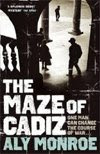I’ve just heard that ‘Icelight’ has been shortlisted for the CWA Ellis Peters Historical Award for Fiction - together with ‘The Crown’ by Nancy Bilyeau, ‘I Will Have Vengeance’ by Maurizio de Giovanni, ‘Bitter Water’ by Gordon Ferris, ‘Prague Fatale’ by Philip Kerr, ‘Sacrilege’ by SJ Parris and ‘A Willing Victim’ by Laura Wilson.
Friday 25 May 2012
Shortlisted for Ellis Peters Historical Fiction
I’ve just heard that ‘Icelight’ has been shortlisted for the CWA Ellis Peters Historical Award for Fiction - together with ‘The Crown’ by Nancy Bilyeau, ‘I Will Have Vengeance’ by Maurizio de Giovanni, ‘Bitter Water’ by Gordon Ferris, ‘Prague Fatale’ by Philip Kerr, ‘Sacrilege’ by SJ Parris and ‘A Willing Victim’ by Laura Wilson.
Tuesday 15 May 2012
A Question of Image
an enjoyable event and we got on well together.
But neither of us was aware that the image our publishers had of us was so similar!
Laura's book has just come out - as always, definitely worth reading.
Tuesday 1 May 2012
Rehabilitation of Cocoa and Men
Yesterday I heard a strange story. It stemmed
from the filming in Edinburgh, with Colin Firth and Nicole Kidman, of one part
of an adaptation of The Railwayman, Eric Lomax’s account of his time on the Burma Railway as a prisoner of the
Japanese during World War 2.
Mr Lomax has actually met Nagase Takashi, his
interrogator and torturer, and they have reconciled – or as Mr Lomax puts it,
‘the hating has to stop’. This took some time, until the late 1990’s. The
victims of torture are double victims. The aftermath is also torture. The
victim is cut off from everyone by distrust and bitterness.
Of course Eric Lomax was by no means alone. It
is also the case that the POWs after WW2 received little in the way of support
or, if necessary, treatment.
What I learnt yesterday is a strange footnote.
It is a sort of recognition of what some of the prisoners went through, but
curiously colonial.
In 1951, what was then the Gold Coast and is
now Ghana had a cocoa problem. Cocoa had been imported years before from Brazil
and was – and is – one of Ghana’s chief crops. Unfortunately, the cocoa trees
were falling victim to swollen shoot disease. Dr Kwame Nkrumah had just won the
first elections in the Gold Coast and an ambitious Cocoa Rehabilitation Scheme
was started.
Somewhat to the surprise of those already there, the British sent a large contingent of men to help. A lot of these turned
out to be ex-POWs. Somebody in Whitehall had had some sort of reaction and had
read how cocoa is grown. Cocoa is not a plantation crop, like rubber or
tea. It’s cultivated by many small holders in small areas cleared in the ‘bush’
or forest. These small holdings are spread out and not easily accessible, except
on foot.
So the new ‘cocoa officers’ were provided with
what were described to me as ‘huts’ and left on their own to police the cocoa
in their area and to sort themselves out –
like versions of Thoreau’s Walden in the tropics – without the benefits
or stresses of a social life. I don’t know who thought – or even if they did –
that a different sort of tropics after these ex POWs experiences in Thailand
and Burma might help. I suspect this was more an effort to chivvy them along
and make them get used to being useful again.
I don’t know how successful this was with the
ex-POWs. Swollen shoot disease persists and, as in 1951, is usually treated by
destroying the cocoa tree. That didn’t make the small holders happy. I don’t
know how the ex-POWs dealt with that.
I do know Eric Lomax was one and that it took
him many more years to forgive his torturer.
Subscribe to:
Posts (Atom)









